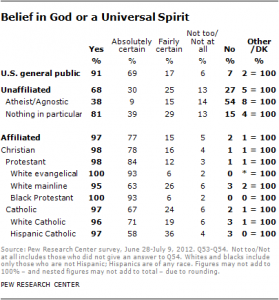[extoc]
Secular Analogs
There are a lot of secular analogs to religious beliefs and patterns of behavior. Some are even remnants of religion, but they are not religious in and of themselves. For example, washing of one’s hands is common in Jewish tradition and it is due to a religious belief. We too wash our hands, but the reason we wash our hands today is because of what we know about germ theory. An example of a remnant would be crossing one’s fingers. Often people will cross their fingers before performing a task even though they do not actually hold any belief that it will provide good luck and certainly not because of the relationship between the cross shape and Jesus Christ. We do this because it is a secular learned pattern of behavior that has been transferred from once religious origins.
Atheism as a Religion
There are various types of atheism. There is negative atheism, which may be considered closer to agnosticism. Negative atheists do not believe in a god, but they do not assert that the non-existence of such a being is beyond question. This is contrary to positive atheists which make the positive assertion that there is no god. Because there are many religions with no gods at all, even by more classical definitions, there are atheistic religions. However, there are usually no other religious beliefs associated with positive or negative atheism. This should not be confused with the term “positive atheism” were positive is being used to mean “a good, affirmative, or constructive quality or attribute.”
One interesting result of this definition of religion is that it implicitly encompasses positive atheism. This is because positive atheism asserts that there is no god. There is no known method of gaining insight into the possible existence of a god. Such a belief therefore falls into the category of religious beliefs and so positive atheists are religious. This may explain the apparent decline in religiosity in the United States. It may not be that religiosity has changed much, but rather there may be a shift towards positive atheism.
Perceived Religiosity
As mentioned above, there are reports that religiosity in the United States has declined. However, it is important to distinguish between an actual decline in religiosity and a perceived decline. Even beyond the impact of positive atheism, many who do not consider themselves to be religious, hold religious beliefs. This may be an example of a modified Dunning-Kruger Effect. Many who are religious many lack the necessary skill set needed to identify religiosity.
A PEW Research poll e ntitled “Religion and the Unaffiliated” and conducted in 2012 shows some very interesting results which support the idea. Considering the segment of the poll on belief in god or a universal spirit. Many who are unaffiliated hold at least some believe that there is a god or universal spirit. Even in the case of atheists, almost 10% strongly believe in a god or universal spirit. We can assume that it is the latter rather than the former for the atheists.
ntitled “Religion and the Unaffiliated” and conducted in 2012 shows some very interesting results which support the idea. Considering the segment of the poll on belief in god or a universal spirit. Many who are unaffiliated hold at least some believe that there is a god or universal spirit. Even in the case of atheists, almost 10% strongly believe in a god or universal spirit. We can assume that it is the latter rather than the former for the atheists.

